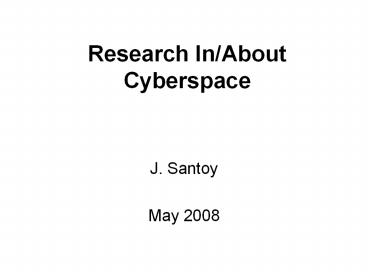Research In/About Cyberspace - PowerPoint PPT Presentation
1 / 40
Title:
Research In/About Cyberspace
Description:
... produced social spaces to gain an understanding of the spatiality of cyberspace ... Hegemonic spatial representations. Site of resistance. Online research ... – PowerPoint PPT presentation
Number of Views:83
Avg rating:3.0/5.0
Title: Research In/About Cyberspace
1
Research In/About Cyberspace
- J. Santoy
- May 2008
2
user
technology
user
technology
research
3
user
technology
reseacher
Research about
Research in
4
- How to conduct research
- in and about
- these spaces of interaction?
5
- How is concept of space theorized?
6
Physical Objective Container for external
materiality
Mental Subjective Internal
(Sajo, 19891993)
7
Physical Objective external
Mental Subjective internal
Social
(Lefebvre, 1991)
8
Physical
Mental
Perceived
Conceived
Social Space
Social Relations
Lived
(Lefebvre, 1991)
9
Perceived
Conceived
Realm of physical experience produced and
reproduced through spatial practices, activated
by movement
Lived
10
Conceived
Realm of mental experience constructed as
(dominant) representations of space, Seek to order
11
Realm of social experience in (dominated) spaces
of representation
Lived
12
- Apply theories of produced social spaces to gain
an understanding of the spatiality of cyberspace
(Saco, 2003)
13
Perceived
Conceived
Social Space
Lived
Theory of social space can inform research in
and/or about cyberspace
14
- Text
- Constitutes a place
- created by a system of signs
- Becomes a space
- when readers interact with the text
- to activate the meaning of the signs
(web page, blog, etc.)
(de Certeau)
15
- Human interaction activates
- physical or perceived realm of sociospatial
experience
Perceived
User
Writer
System
Reader
16
- What are the implications for researchers?
- Cyberspace is a different ground of inquiry
17
(No Transcript)
18
(No Transcript)
19
(No Transcript)
20
- Researcher own interactions constitute space
- Leads to methodological and ethical questions
21
- Researchers perception of interaction?
- Which methods provide more objective analysis?
Perceived
Author Reader Researcher
Text Affordances
22
Methods interactions with the text
- Rhetorical analysis
- Web text as spokesperson
- Which elements chosen for analysis?
- Was there bias and subjectivity?
- My interpretations as valid as those of producers
of the text (Rouzie)
23
- Participant can confirm or contradict researcher
interpretation (McKee) - Triangulation needed?
- Include participants
- Interactions move into real spaces
- How will interaction influence participant
behavior?
24
Conceived
Mental constructs Representation Order
Producer Ownership
25
- Who
- benefits from
- Or
- owns
- the presentation?
26
- Interactions help users create representations
which attempt to order human movement -
Who -
benefits?
Conceived
Mental constructs Representation Order
Producer Ownership
27
researcher
Participant(s)
Power dynamics Repressive/productive
(Foucault)
28
Participant(s)
Researcher
Power dynamics Repressive
(Foucault)
29
researcher
Participant(s)
Power dynamics productive
(Foucault)
30
- Interactions representations
- order human movement
-
Private? -
Public?
Perceived/Conceived
Mental constructs Representation Order
Producer Ownership
Protection?
Confidentiality?
Future Effect?
31
- Methods Choices affect representation
- Whose knowledge is privileged?
- Lack of triangulation with participants
- Privileges researcher voice/perspective
- Control of the representation
32
- How do methodological choices affect participants
lived space? -
Private? -
Public? -
Protection? -
Confidentiality? -
Future Effect?
Lived
Experienced passively Hegemonic spatial
representations
Site of resistance
33
(No Transcript)
34
- Online research spaces are not neutral,
- But practiced spaces
35
- Go beyond what IRB requires
- Savvy bloggers use anti-indexing code
36
- Capacity of creating new spatial orders
- via resistance,
- disrupting and overturning meaning
- created by traditional research practices.
37
(No Transcript)
38
(No Transcript)
39
(No Transcript)
40
Questions?janie.santoy_at_ttu.edu































